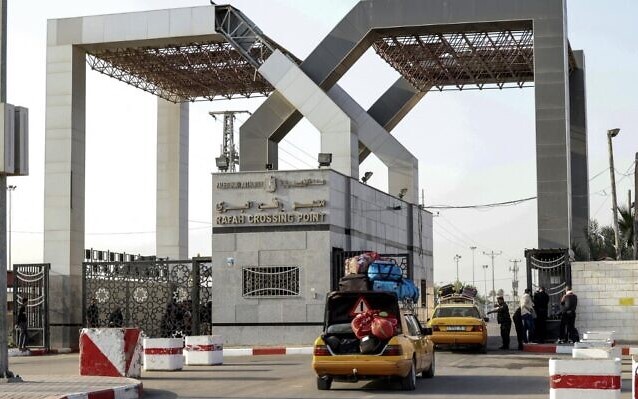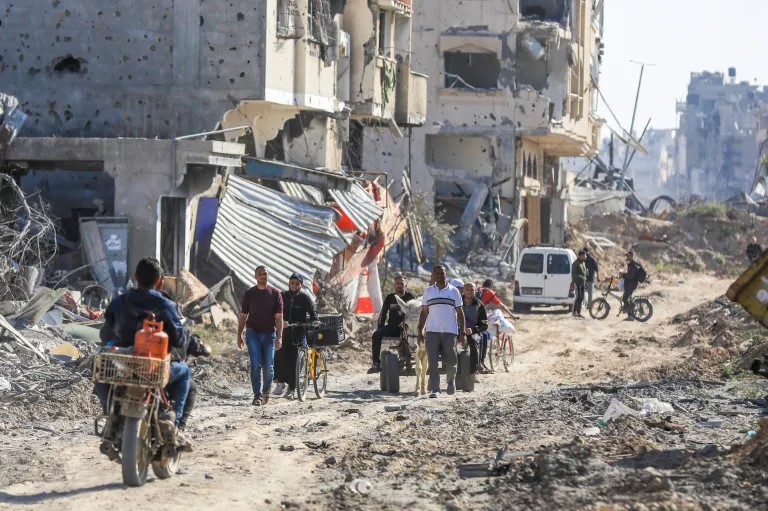Amidst stalled negotiations in Cairo, Egypt, Israeli Prime Minister Benjamin Netanyahu has announced that “there is a date” for Israel’s controversial plans to launch a ground operation in the south Gaza city of Rafah, a plan that has been subject to extensive international condemnation from Israel’s enemies and allies alike.
A Rafah Operation
Israeli Prime Minister Benjamin Netanyahu released a short statement in which he spoke on ongoing negotiations between Israel and Hamas in Cairo, stating that it was Israel’s primary goal to achieve the release of all remaining Israeli hostages still held by Hamas, as well as a “complete victory over Hamas.”
At the end of his statement, Netanyahu once again reiterated Israel’s intention to launch an operation in the city of Rafah, but also said that “it will happen – there is a date.”
“This victory requires entry into Rafah and the elimination of the terrorist battalions there. It will happen – there is a date” -Israeli Prime Minister Benjamin Netanyahu
?????? ???? ????? ????? ?? ?????? ?????, ????? ?????? ?? ???? ????? ???????? ?????? ????? ?? ??????? ????? ?????? ????? ?? ????.
??????? ??? ????? ????? ????? ?????? ????? ????? ??. ?? ???? – ?? ?????. pic.twitter.com/KOhStmGSGp
— Benjamin Netanyahu – ?????? ?????? (@netanyahu) April 8, 2024
Netanyahu gave no indication as to when the operation would be taking place.
Israel, and Netanyahu personally, have been warned against carrying out an operation in Rafah.
Rafah was previously established by Israel to be one of the safe areas within Gaza to which civilians evacuating from the north could go. As such, it has become host to approximately 1.4 million people, more than half of Gaza’s 2.3 million population. Rafah sits on the Egyptian border, and has also been the primary entry point for aid entering Gaza.
Many fear that an Israeli operation in Rafah would be immensely costly in civilian lives due to the large amount of civilians residing there. On top of this, it would pose significant challenges to humanitarian operations in Gaza due to the importance that Rafah plays in humanitarian operations. UN Secretary General Antonio Guterres has said that an operation in Rafah would be the “nail in the coffin” for humanitarian operations that already face extensive challenges within Gaza.
Netanyahu has been insistent, however, that an operation in Rafah is necessary to completely defeat Hamas. Israel claims that Rafah is host to an extensive tunnel network, host to large amounts of Hamas militants as well as the remainder of the Israeli hostages still held by Hamas, of which there are approximately 130. Around 30 of the hostages still held by Hamas are believed to have died while being held within Gaza.

The US and Israel have continually clashed over the issue, with the US having on multiple occasions publicly declared their opposition to such an operation. In a recent visit to Israel, US Secretary of State Antony Blinken warned that the operation posed too great a risk to civilians, and risked isolating Israel completely on the world stage, more so than they have been already.
The US and Israel have been in discussions for US proposed alternatives to an Israeli operation in Rafah, with the US having stated that while they understand, and support Israel’s wish to destroy Hamas, that “a major military ground operation in Rafah is not the way to do it.”
Netanyahu has said that the operation will carry on with or without the US’ support. He has claimed that Israel recognizes the threat posed to civilian populations, and that Israel has a plan to evacuate civilians and address the humanitarian issues that would arise.
What is unknown, however, is where exactly civilians would evacuate to. The Israeli and Egyptian borders remain closed, and strikes continue throughout much of Gaza, leaving very few areas of Gaza safe.
There were hopes among the US that Israel would refrain from launching the operation, particularly as they discussed alternatives to the operation, however Netanyahu having set a date proves that he intends to be true to his word that an operation in Rafah will go on with or without the US’ approval.

The launch of an operation is likely to further diminish relations between the US and Israel, which have already been in a rapid decline as the two nations clash over several issues. The recent Israeli strike on several aid workers of the World Central Kitchen (WCK) was also subject to severe criticism from the US. The strike killed seven aid workers, including several foreign volunteers.
Notably, Netanyahu’s announcement came only a couple of days after Israel withdrew their 98th Commando Division from Gaza in order to “recuperate and prepare for future operations.” The Israeli Minister of Defence, Yoav Gallant, said that the “achievements made by the IDF’s Division 98 and its units are extremely impressive. They have eliminated terrorists, and destroyed terror targets.”
The withdrawal of troops brings Israel’s troop count within Gaza to its lowest point since they entered Gaza in October. The IDF’s Nahal Brigade and the 162nd Division are still within Gaza, in order to continue operations, and “preserve the IDF’s freedom of action and its ability to conduct precise intelligence based operations.”
The withdrawal briefly called into question the future of an offensive into Rafah, as analysts theorized on whether or not it signalled a change in Israel’s military strategy. With Netanyahu’s announcement, however, it appears that Israel is merely restructuring its divisions in order to prepare for their offensive into Rafah.
“No Progress Yet”
As Israel announces plans for future operations, negotiations have been ongoing in Cairo, Egypt, to secure a temporary ceasefire. Although Egyptian state media Al-Qahera News had claimed that there was “progress” in the negotiations, Hamas appears to be less hopeful on the matter. A Hamas official told Reuters that “there is no change in the position of the occupation and, therefore, there is nothing new in the Cairo talks. … There is no progress yet.”
Both sides respective negotiation teams have departed from Cairo as of Monday in order to consult with leadership on the progress of the negotiations, and the proposed deal from the Israeli side. They have 48 hours in order to discuss both sides proposals, before they will head back to Cairo in order to continue negotiations.
Hamas later released an official statement on the talks, and how they have been going, which may be read below.
In the name of God, the Most Gracious, the Most Merciful
Press Statement
During the last round of negotiations in Cairo, Hamas took over the (Israeli) position after the efforts of mediators in Egypt, Qatar, and America.
While the Hamas movement appreciates the great efforts made by the mediators, and while the movement is keen to reach an agreement that puts an end to the aggression against our people, the (Israeli) position remains stubborn and has not responded to any of the demands of our people and our resistance.
Despite this, the movement’s leadership is studying the submitted proposal with all national responsibility, and will inform the mediators of its response once this is completed.
Islamic Resistance Movement – Hamas
Israel’s side has also given mixed signals on the negotiations. Israeli news outlet Ynet quoted an unidentified Israeli official as saying “we still don’t see a deal on the horizon. The distance is still great, and there has been nothing dramatic in the meantime.” However internal pressure is growing in Israel to secure the release of the hostages, with protests regularly taking place demanding the government do more to secure their release. As pressure grows, Israel may be more inclined to take a deal that is less favourable to them.
The negotiations in Cairo bear similarities to several other negotiations that have been held between Israel and Hamas in a number of different locations, negotiations which have thus far been unable to produce a deal.

The proposed deal is also similar to that proposed in previous negotiations. A temporary ceasefire will take place in three stages. Israel’s hope is that 40 of the most vulnerable hostages will be able to go free during the first stage. In the second stage, there is to be the prospect of an extended ceasefire. It is Israel’s hope that, through all three stages, they will be able to secure the release of all remaining hostages.
However, a number of key differences remain in the way of securing a final deal. Both sides have put forward points in negotiation processes that the other side has thus far proven unwilling to concede on. Namely, while Hamas is calling for a permanent end to the war, and a complete Israeli withdrawal from Gaza, Israel has been insistent that any established ceasefire only be temporary, and that the war will only end when they completely destroy Hamas. Additionally, Israel has stated they will hold security over Gaza when the war is over (assuming an Israeli victory).
Israel holding security over Gaza following the war is another clashing point between the US and Israel, with the US stating they would like to see a reformed Palestinian Authority in charge of Gaza.
While the two sides acceptance or refusal of the deal is not yet officially announced, the amount of barriers that remain in the way make it unlikely for the present proposals to be accepted.
Notably, these negotiations for a hostage deal, tied to a ceasefire, are ongoing two weeks after the UN Security Council passed a resolution demanding a ceasefire for the remainder of Ramadan, which would become a permanent ceasefire. Ramadan is due to end today, April 9th, and the ceasefire has yet to have been implemented in any capacity.


